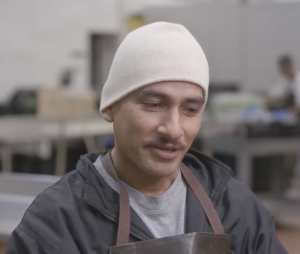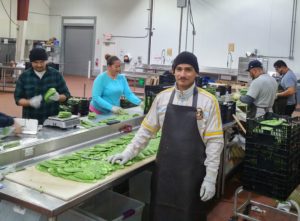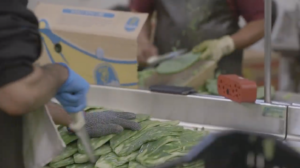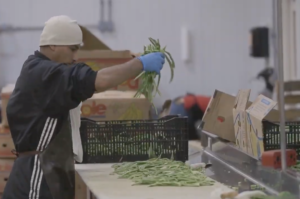Updated April 2019
Winner of 2016 Faces of Entrepreneurship Award
 Vicente Quintana started El Nopalito Produce in Watsonville, CA with a 30-pound box of cactus paddles. In just eight years he turned his kitchen-table business into a thriving concern with ten employees, processing 10,000 pounds a week and distributing in more than 30 markets across central California.
Vicente Quintana started El Nopalito Produce in Watsonville, CA with a 30-pound box of cactus paddles. In just eight years he turned his kitchen-table business into a thriving concern with ten employees, processing 10,000 pounds a week and distributing in more than 30 markets across central California.
Tender, young cactus leaves, or nopales, are a staple of Mexican cuisine. However, before they can be cooked and eaten they need to be trimmed and peeled and cut. It’s a time-consuming and sometimes prickly process which is why most people buy them pre-packed in convenience bags. These days processing is done by machines.
That’s not how Vicente operates at El Nopalito. He and his employees hand-process every cactus paddle. The extra effort pays off. Markets carrying Vicente’s nopales say that their quality keeps picky customers coming back and they have a longer shelf life than the machine-processed competitors. Vicente’s quality is so good that a few markets have dumped other brands and carry El Nopalito Produce exclusively.
The daily toil

Success didn’t come overnight, and it didn’t come alone. By 2013 he was struggling to process 2,000 pounds every week to meet the demands of his local markets. He realized he couldn’t grow the business from his kitchen and rented processing space in a local grocery store. But alone he could only do so much. Also, Vicente was beginning to worry about inspections, licenses and business plans – things he needed to meet existing demand.
Vicente saw an ad for a business education program called “Empresario” on a local TV channel. El Pajaro Community Development Corporation (El Pajaro) offered a 10-week training that teaches people how to build a business plan. When he took the class, Vicente learned about El Pajaro’s Commercial Kitchen Incubator, where people can rent time in a commercial-quality kitchen that meets stringent health and safety regulations at a reasonable rate, drastically reducing start-up costs for small food-based businesses. Vicente knew it was a perfect fit.
When the commercial kitchen opened in the fall of 2013, Vicente was able to increase production. Meanwhile, El Pajaro kept assisting him in other ways.
The biggest benefit that he has obtained from the organization is being able to obtain all the proper documentation and all that he needs to have his business operate in a legit way.
Cesario Ruiz, El Pajaro’s Kitchen Incubator Facility Manager
Knowing that language was also a big barrier for Vicente, Cesario wrote down all the documentation for him to make sure El Nopalito was providing the right information to the state. Cesario estimates that Vicente received more than 40 hours of individualized support from El Pajaro.

In no time, El Nopalito’s production went from 500 pounds a week to 1,000 and then 1,200 – thanks to a distribution deal with the Mi Pueblo grocery chain which owned 19 stores in the Central Coast and the Bay Area. Vicente started hiring help, and within two years he had three employees.
Unexpected setbacks
But he has his ups and downs. A little over a year ago, Cárdenas Market bought Mi Pueblo and dropped El Nopalito.
He ended up losing his biggest account and that set him back, but he already had a pretty established number of accounts.
Cesario Ruiz
Vicente began thinking of other ways to expand and diversify his business. To increase his distribution area, Vicente needed a refrigerated truck to deliver fresh product to other parts of California. “Unfortunately, we weren’t able to help him because it exceeded the amount that we could help him with,” said Cesario. Even though El Pajaro couldn’t help with funding, Vincente found a different source to buy the truck. And he didn’t stop there.
“His vision has always been to get some land,” said Cesario. Vicente met a farmer in Los Baños and bought his entire nopales production. But the following year, the farmer couldn’t properly care for the farm and didn’t have a good yield, which meant no nopales for Vicente. That got him thinking about purchasing or leasing the land. “The organization helped him put some projections together again, making sure that he was making the right move.”
Vicente recently acquired 30 acres of land and wants to increase the yields to have enough production. And he has bigger plans.
One of the things he really wants to do is certify this piece of land as organic.
Cesario Ruiz
The challenges of success

However, organic plans are on hold after an unexpected event. Two months ago, Cárdenas Market reached out to him – they wanted him to be their official nopal distributor again. This meant means more business for Vicente, but that comes with its own problems. He doesn’t have enough supply to fulfill his orders. After doing some research, he found something that could be the solution.
Vicente found that he could buy hand-peeled nopales from a distribution center in LA.
Cesario Ruiz
By outsourcing production, Vicente can focus on distribution and reach his fulfillment goals. However, that means cutting his labor force by 50 percent in the short run. Cesario believes he can make up for that once his business grows.
Cesario is confident that Vicente can make it work because he’s always looking for ways to grow his business – like producing frozen nopales.
He’s in the middle of developing a product that will hold in the freezer and still continue to provide the right consistency and the right quality to the end consumer. It’s exciting to see how his mentality doesn’t stop, it continues moving forward.
Cesario Ruiz
Written by Cassandra Stern, a freelance writer from Albany, CA.
